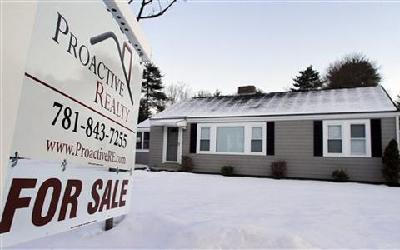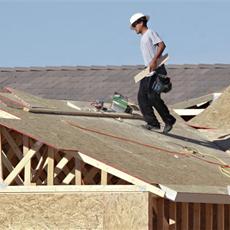
CHRISTOPHER CRUISE: Welcome to THIS IS AMERICA in VOA Special English. I'm Christopher Cruise.
FAITH LAPIDUS: And I'm Faith Lapidus. This week on our program, we look at the American housing market after the collapse that pulled the economy into a recession. We also talk to experts about their advice for people who still want to buy a home.
(MUSIC)
CHRISTOPHER CRUISE: The Great Recession lasted a year and a half. It began in December of 2007. At that time, almost seven in ten Americans owned a home. That was a record high, and it included about 60 percent of blacks and Hispanics. Policies designed to increase home ownership in America included special efforts to help poorer groups in society.
As rates of ownership rose, so did housing prices. They became inflated by too much lending, too much borrowing and risky new ways of financing sales. Banks no longer had to worry about the risk of a home mortgage loan not getting repaid. They could simply sell their loans to investors.
Housing prices reached a high point in 2006. The crash that followed spread through the economy. It was a cause of the financial crisis that struck the world in 2008.
FAITH LAPIDUS: Next Monday the Census Bureau releases its latest report on the home ownership rate. Its last report in November showed that the rate had fallen to just under 67 percent, from a high of 69 percent.
RealtyTrac is a company that counts foreclosures, the legal term for bank repossessions. It says over three million Americans have lost their homes this way since 2006. And it estimates that three million more foreclosures are yet to come.
RealtyTrac predicts that 2011 will have even more than the record one million foreclosures last year. But it says the number should start to fall next year.
Foreclosure rates have been high in states where prices rose quickly and almost anyone could get a loan. Rick Sharga is a senior vice president at RealtyTrac. He says foreclosure rates are now increasing even in places where home prices did not rise quickly and risky loans were not a problem. These include cities like Boise, Idaho, and Charleston, South Carolina.
The recession ended in June of 2009. The problem now is the slow recovery from the loss of millions of jobs. In all, about four percent of American homeowners are in foreclosure -- about four times the normal rate.
(MUSIC)
CHRISTOPHER CRUISE: To some people, a bad situation can also be a good opportunity. Home prices and mortgage interest rates are lower than they have been in many years.
Springtime is traditionally when many Americans begin looking for a home. Real estate agents hope this coming spring will be busier.
In some cities, home prices have increased, a sign of growing demand. Greg McBride is a home buying specialist and senior financial analyst with Bankrate.com. He says now may be a good time to buy a home.
GREG McBRIDE: "Especially in the hardest-hit housing markets, prices are down in some cases more than 50 percent, so you're already getting a much better deal than anybody's had. In some cases, for new houses, these things are selling at a fraction of what they were built for. Yeah, prices might fall a little bit further, but I think you have to look at how much the affordability has improved and not worry so much about trying to catch the bottom."

FAITH LAPIDUS: Just last week, the Commerce Department reported an unexpected drop in December in the number of housing starts by builders. But there was also an unexpectedly big increase in building permits approved for future construction.
That increase could be a sign of hope, although builders might have also had other reasons. Some may have been trying to get permits approved before building codes changed this month in California, Pennsylvania and New York.
CHRISTOPHER CRUISE: In some cities, home prices are still falling. The Standard and Poor's/Case-Shiller Index measures home prices in 20 large American cities. By last October, prices were down nearly 30 percent from their peak in the middle of 2006.
And some experts believe prices will continue to fall, in part because lenders are now trying to sell millions of foreclosed properties. High unemployment is another reason prices may continue to fall.
In the past year, home prices fell in 18 of the 20 largest cities. Many experts think the American housing market will not recover for at least three more years.
FAITH LAPIDUS: Peter Schiff heads Euro Pacific Capital, an investment company. He is among those who believe housing prices have still not reached their low point.
PETER SCHIFF: "There's so many people that are waiting for real estate prices to recover, talking about 'Oh, the bottom is in, now real estate's gonna start to go back up.' I'm just trying to point out how crazy those assumptions are, because real estate prices are still too high.
"The government has done a lot to try to artificially prop up real estate prices and they're still doing that. But ultimately prices are going to come down. In fact, they're probably going to come down even more than otherwise would have been the case had the government simply let the market run its course."
CHRISTOPHER CRUISE: Over the years, government policies also helped many Americans become homeowners. Tax laws, for example, have made owning a home more profitable for many people than renting an apartment. Policies like these have helped raise rates of home ownership from about 40 percent in the 1940s.
Traditionally, Americans have often had to wait years to save enough money for a down payment. But in recent years lenders often let people finance up to the full value of a home.
Owning a home is considered part of the American Dream. Many people see it as good for society. But Peter Schiff says it may be time for a different dream.
PETER SCHIFF: "A lot of young people are going to move back with their parents, a lot of elderly parents will move in with their grown children, a lot of people will have roommates that don't have them today. Many Americans might rent out rooms in their houses, and so you're going to have a lot less demand for houses."
FAITH LAPIDUS: Maybe, maybe not. But the fact is, many Americans still want to own a home. Only a small number of countries have a higher rate of home ownership. These include Mexico, India, Spain, Ireland, Australia and Britain.
In America, the traditional way to finance a home purchase is with a 30-year, fixed-rate mortgage loan. Some people have a 15- or 20-year loan, often with an adjustable interest rate instead of a rate that never changes. Once people own their house "free and clear," all they have to pay are property taxes and insurance.
CHRISTOPHER CRUISE: But Americans move a lot. Homeowners can repay their mortgage loans early by selling their home. But right now, some owners who want to sell are finding that difficult to do. In some cases, this is because they are "underwater." That means they owe more on their loan than their home is worth.
Rick Sharga from RealtyTrac says up to one-fourth of all homes that still have a mortgage loan balance are in this situation. The percentage is higher in some states, including California, Nevada, Arizona and Florida.
In other cases, owners cannot sell their house because the person who wants to buy it cannot get a loan. Lending requirements have changed for people trying to buy a home or refinance an existing loan.
Banks are looking more closely at income, debts and credit history. They want more proof that borrowers will have enough money to repay their loan.
FAITH LAPIDUS: In some areas of the country, sales of new homes are at their lowest level since the 1960S. So what would Peter Schiff advise his family or friends if they asked him about buying a home right now?
PETER SCHIFF: "If you can put very little down and lock in low rates, depending on the property and how long you're planning on staying there, and what the relative rents are for the same or similar properties where you are, for some people buying can make sense. But don't look at it -- it's not necessarily an investment, it's just something that would make sense for you right now.
"I don't think people should be buying real estate as an investment right now or investment properties, especially if they have to put down 20 or 30 percent. I think that there's much better things to do with their down payment than buy a piece of property."
CHRISTOPHER CRUISE: Greg McBride from Bankrate.com agrees that buying a home might still make sense, as long as people do not expect short-term gains.
GREG McBRIDE: "Buying a house is a lot like getting married: You have to be in it for the long haul, and be prepared for the commitment -- in this case, the financial commitment that's involved with owning a house."
(MUSIC)
FAITH LAPIDUS: Our program was produced by Brianna Blake. I'm Faith Lapidus.
CHRISTOPHER CRUISE: And I'm Christopher Cruise. Tell us about the housing market where you are. Is owning a home considered an important part of the culture? You can share your comments at voaspecialenglish.com or on Facebook and Twitter at VOA Learning English. You can also find transcripts, MP3s and podcasts of our programs. Join us again next week for THIS IS AMERICA in VOA Special English.
repossess: to take back property or goods from somebody who has arranged to buy them but who still owes money for them or cannot pay(因買者未如期付款而)收回(商品),重新占有(房產(chǎn)等)
How bad loans in US can have a far reach
'Put-backs,' 'robo-signers' put new pressure on US housing market
Couples fake divorce to buy property
Property market set to make soft landing
(來源:VOA 編輯:崔旭燕)
